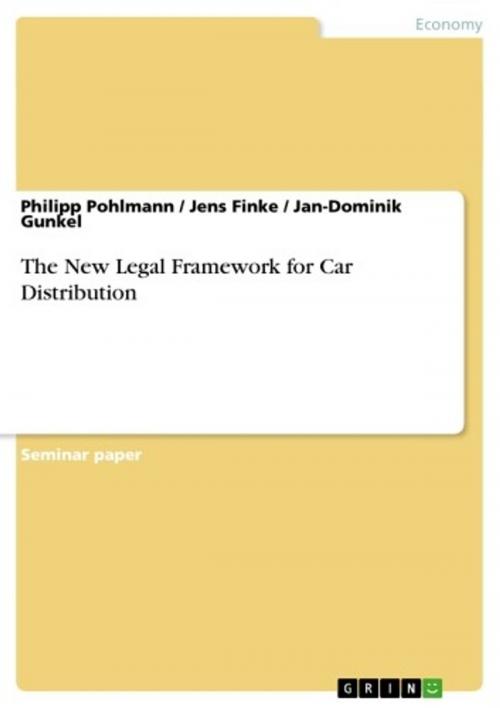The New Legal Framework for Car Distribution
Business & Finance, Management & Leadership, Industrial Management| Author: | Philipp Pohlmann, Jens Finke, Jan-Dominik Gunkel | ISBN: | 9783638382687 |
| Publisher: | GRIN Publishing | Publication: | June 1, 2005 |
| Imprint: | GRIN Publishing | Language: | English |
| Author: | Philipp Pohlmann, Jens Finke, Jan-Dominik Gunkel |
| ISBN: | 9783638382687 |
| Publisher: | GRIN Publishing |
| Publication: | June 1, 2005 |
| Imprint: | GRIN Publishing |
| Language: | English |
Seminar paper from the year 2004 in the subject Economics - Industrial Economics, grade: 1.0, Otto Beisheim School of Management Vallendar (Institute for Industrial Organization), course: Strategic Competition and European Competition Policy, 61 entries in the bibliography, language: English, abstract: The present paper discusses the new legal framework for the automotive distribution, which has been set by regulation 1400/2002 of the European Commission, and clarifies the underlying rationale of this so-called block exemption. To this end, the relevant market has been analysed along the structure conduct performance paradigm. Additionally, the existing trends, e. g. the changing consumer preferences, the changing technological standards, and an increasing number of independent service chains, were investigated to integrate the dynamics into the model. In this context the meaning and the impact of the regulation have been detailed with respect to consumer welfare.The analyses have shown that the new regulation complies with the guiding principles of competition policy and thus fosters competition in the industry. This stands in contrast to its predecessors, which were influenced by lobbying of the car industry and had thus laid the foundation for a heavily regulated business. As shown in this paper, a leap towards increased consumer welfare has been made by weakening the market power of the industry. Among others, the separation of sales and services, the permission of multi-brand outlets and the ban of price discrimination can be named as examples for reforms brought forward in the regulation. Furthermore, the so-called location clause will be abolished as of October 2005, which means that dealerships are allowed to open new outlets anywhere in the common market without the consent of the manufacturer. However, in the course of disallowing vertical restraints, of which some had previously helped to secure efficiencies in the value chain, a relative welfare loss has also developed. For instance, the increased free-riding issues could inspire a development to the detriment of the consumer and the convergence of prices at a high level could be disadvantageous to consumers in low income member states. Although the regulation has already come a far way, the critique that is voiced at the end of this paper, shows that there is significant room for improvement, once the regulation expires in 2010. Key points are the price convergence towards the level of the high price countries, some inconsistencies in the regulation and a possible loss of intangible consumer welfare. In the end whether the additional welfare surplus outweighs the new welfare loss has to be decided on a per country basis.
Seminar paper from the year 2004 in the subject Economics - Industrial Economics, grade: 1.0, Otto Beisheim School of Management Vallendar (Institute for Industrial Organization), course: Strategic Competition and European Competition Policy, 61 entries in the bibliography, language: English, abstract: The present paper discusses the new legal framework for the automotive distribution, which has been set by regulation 1400/2002 of the European Commission, and clarifies the underlying rationale of this so-called block exemption. To this end, the relevant market has been analysed along the structure conduct performance paradigm. Additionally, the existing trends, e. g. the changing consumer preferences, the changing technological standards, and an increasing number of independent service chains, were investigated to integrate the dynamics into the model. In this context the meaning and the impact of the regulation have been detailed with respect to consumer welfare.The analyses have shown that the new regulation complies with the guiding principles of competition policy and thus fosters competition in the industry. This stands in contrast to its predecessors, which were influenced by lobbying of the car industry and had thus laid the foundation for a heavily regulated business. As shown in this paper, a leap towards increased consumer welfare has been made by weakening the market power of the industry. Among others, the separation of sales and services, the permission of multi-brand outlets and the ban of price discrimination can be named as examples for reforms brought forward in the regulation. Furthermore, the so-called location clause will be abolished as of October 2005, which means that dealerships are allowed to open new outlets anywhere in the common market without the consent of the manufacturer. However, in the course of disallowing vertical restraints, of which some had previously helped to secure efficiencies in the value chain, a relative welfare loss has also developed. For instance, the increased free-riding issues could inspire a development to the detriment of the consumer and the convergence of prices at a high level could be disadvantageous to consumers in low income member states. Although the regulation has already come a far way, the critique that is voiced at the end of this paper, shows that there is significant room for improvement, once the regulation expires in 2010. Key points are the price convergence towards the level of the high price countries, some inconsistencies in the regulation and a possible loss of intangible consumer welfare. In the end whether the additional welfare surplus outweighs the new welfare loss has to be decided on a per country basis.















